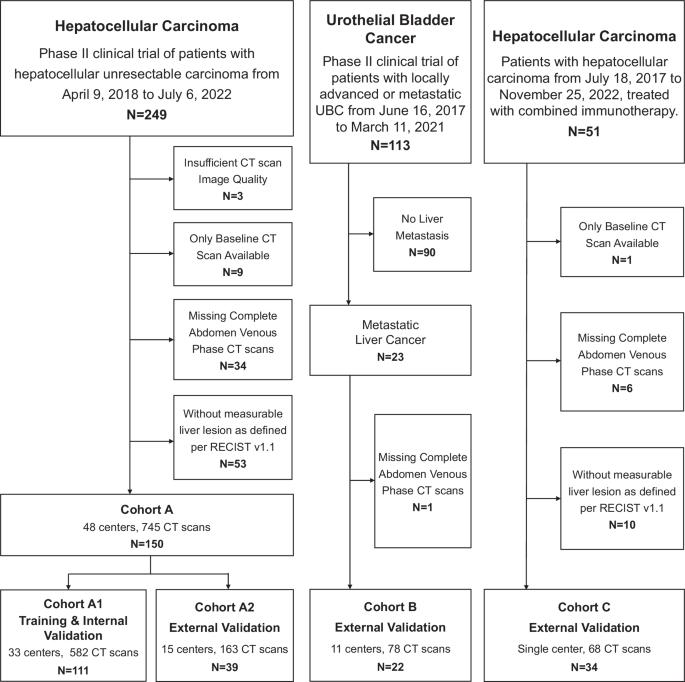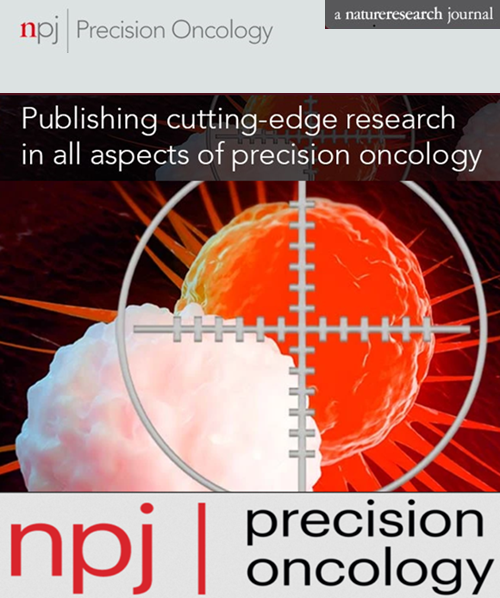利用深度学习对肝癌 CT 扫描结果进行肿瘤治疗效果和终点评估
IF 6.8
1区 医学
Q1 ONCOLOGY
引用次数: 0
摘要
在肿瘤临床试验中,利用连续 CT 扫描进行准确的治疗反应评估至关重要。然而,肿瘤专家根据实体瘤反应评估标准(RECIST)指南进行的评估是主观的、耗时的,有时甚至是错误的。晚期肝癌在 CT 成像上通常表现为多灶性肝脏病变,因此与其他恶性肿瘤相比,准确定性更具挑战性。在这项工作中,我们开发了一种基于深度学习的肝癌肿瘤体积引导综合客观反应评估(RECORD)。RECORD 可进行肝脏肿瘤分割,然后进行基于体积总和(SOV)的治疗反应分类和新病灶评估。然后,它可以提供反应、稳定性和进展的治疗评估,并计算无进展生存期(PFS)和反应时间。RECORD 管道是以 CNN 和 ViT 为骨干开发的。通过内部五倍交叉验证和外部验证,在涉及 60 个跨国中心、206 名患者和 891 次 CT 扫描的三个纵向队列中对其性能进行了评估。采用最有效骨架的 RECORD 在基于 SOV 的疾病状态分类方面的平均 AUC-response 为 0.981,AUC-stable 为 0.929,AUC-progression 为 0.969,在新病灶识别方面的 F1 分数为 0.887,在所有队列的最终治疗结果评估方面的准确性为 0.889。RECORD 的 PFS 和反应时间预测与临床医生的评估结果密切相关(P < 0.001)。此外,与人类评估的 RECIST 结果相比,RECORD 能更好地对高危和低危患者的总生存期进行分层。总之,RECORD 在分析肝脏病变以评估治疗反应方面表现出了高效性和客观性。进一步的研究应将这一方法推广到其他转移器官部位。本文章由计算机程序翻译,如有差异,请以英文原文为准。

Deep learning for oncologic treatment outcomes and endpoints evaluation from CT scans in liver cancer
Accurate treatment response assessment using serial CT scans is essential in oncological clinical trials. However, oncologists’ assessment following the Response Evaluation Criteria in Solid Tumors (RECIST) guideline is subjective, time-consuming, and sometimes fallible. Advanced liver cancer often presents multifocal hepatic lesions on CT imaging, making accurate characterization more challenging than with other malignancies. In this work, we developed a tumor volume guided comprehensive objective response evaluation based on deep learning (RECORD) for liver cancer. RECORD performs liver tumor segmentation, followed by sum of the volume (SOV)-based treatment response classification and new lesion assessment. Then, it can provide treatment evaluations of response, stability, and progression, and calculates progression-free survival (PFS) and response time. The RECORD pipeline was developed with both CNN and ViT backbones. Its performance was evaluated in three longitudinal cohorts involving 60 multi-national centers, 206 patients, 891 CT scans, using internal five-fold cross-validation and external validations. RECORD with the most effective backbone achieved an average AUC-response of 0.981, AUC-stable of 0.929, and AUC-progression of 0.969 for SOV-based disease status classification, F1-score of 0.887 for new lesion identification, and accuracy of 0.889 for final treatment outcome assessments across all cohorts. RECORD’s PFS and response time predictions strongly correlated with clinician’s assessments (P < 0.001). Moreover, RECORD can better stratify high-risk versus low-risk patients for overall survival compared to the human-assessed RECIST results. In conclusion, RECORD demonstrates efficiency and objectivity in analyzing liver lesions for treatment response evaluation. Further research should extend the pipeline to other metastatic organ sites.
求助全文
通过发布文献求助,成功后即可免费获取论文全文。
去求助
来源期刊

NPJ Precision Oncology
ONCOLOGY-
CiteScore
9.90
自引率
1.30%
发文量
87
审稿时长
18 weeks
期刊介绍:
Online-only and open access, npj Precision Oncology is an international, peer-reviewed journal dedicated to showcasing cutting-edge scientific research in all facets of precision oncology, spanning from fundamental science to translational applications and clinical medicine.
 求助内容:
求助内容: 应助结果提醒方式:
应助结果提醒方式:


